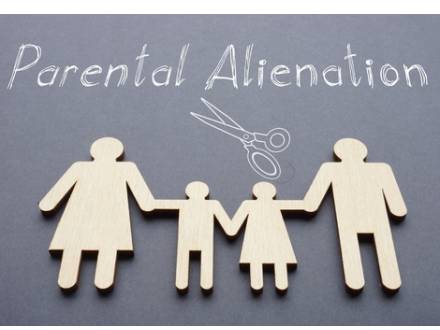Recent Blog Posts
Parental Alienation vs. Justified Estrangement
 Divorce can be a traumatic experience – both for the spouses divorcing and the children. If arguments and negotiations failed when determining the allocation of parental responsibilities, then a judge may have made the final determinations regarding which parent would be designated as the primary residential parent and which would have parenting time. After all the time and discussions, it can be disheartening for one parent to be rejected by his or her child.
Divorce can be a traumatic experience – both for the spouses divorcing and the children. If arguments and negotiations failed when determining the allocation of parental responsibilities, then a judge may have made the final determinations regarding which parent would be designated as the primary residential parent and which would have parenting time. After all the time and discussions, it can be disheartening for one parent to be rejected by his or her child.
Although parental alienation is a serious threat – and one that is talked about much more frequently – in some cases, the issue is justified rejection and estrangement rather than parental alienation. When a child has a legitimate reason to reject a parent, it is known as justified rejection and estrangement. If your child no longer wants to spend time with you during your court-ordered parenting time, it is important that you determine whether parental alienation or justified estrangement is at hand.
How Can You Shield Your Child from a Toxic Divorce?
 If your divorce feels like too much to handle, imagine what your child must feel like. Children who see their parents bicker throughout the divorce are more likely to experience emotional trauma than those whose parents remain civil. While it is not always possible to avoid a toxic divorce when your spouse is a narcissist or an angry bully, you should always do your best to keep your child away from your disagreements.
If your divorce feels like too much to handle, imagine what your child must feel like. Children who see their parents bicker throughout the divorce are more likely to experience emotional trauma than those whose parents remain civil. While it is not always possible to avoid a toxic divorce when your spouse is a narcissist or an angry bully, you should always do your best to keep your child away from your disagreements.
Children often internalize their emotions during a divorce, and may even feel that it is somehow their fault that their parents cannot be in the same room without an argument breaking out. There are things you can do to shield your child from a toxic divorce, but the most important first step is speaking to a knowledgeable Geneva, IL divorce lawyer from Serrano Hanson & Hurtado, LLC. Below are further steps you can take to keep your child away from a toxic divorce.
Never Take Your Child to Divorce Court Hearings
Unless the court requires your child to be in court, you should never bring him or her to a divorce court hearing. It is unlikely your child will understand the issues being discussed, and a child should never witness parents speaking negatively about one another.
What Should You Know About Legal Separation in Illinois?
 Perhaps you know your marriage is on the brink of divorce, but you are not quite ready to take that final step. In Illinois, you can choose legal separation, which allows you and your spouse to live apart while remaining married. This gives you some breathing room to determine whether you really want to divorce and even see what it might be like to be divorced. If you are unsure whether you want to divorce your spouse, speak to a knowledgeable Geneva, IL divorce attorney from Serrano Hanson & Hurtado, LLC. We will help you make the best decisions for your situation and your future.
Perhaps you know your marriage is on the brink of divorce, but you are not quite ready to take that final step. In Illinois, you can choose legal separation, which allows you and your spouse to live apart while remaining married. This gives you some breathing room to determine whether you really want to divorce and even see what it might be like to be divorced. If you are unsure whether you want to divorce your spouse, speak to a knowledgeable Geneva, IL divorce attorney from Serrano Hanson & Hurtado, LLC. We will help you make the best decisions for your situation and your future.
What Are the Requirements of an Illinois Legal Separation?
A separation petition must be filed by one spouse to start the legal separation process. At least one of the parties must reside in Illinois, and the parties must live apart before filing for legal separation. While the law states that the parties must live apart, this does not necessarily mean that they must live in different houses. The court understands that not every couple has the financial means to afford two households during the separation.
Can I Get a Post-Decree Modification for Spousal Maintenance? | IL
 Spousal maintenance can often be one of the most acrimonious parts of a divorce. Spouses ordered to pay support are rarely happy to do so, even if the receiving spouse needs and deserves the support. While a spousal maintenance order may be reviewed periodically, if something major occurs in the life of either ex-spouse that represents a substantial change in circumstances, either spouse can request a post-decree modification.
Spousal maintenance can often be one of the most acrimonious parts of a divorce. Spouses ordered to pay support are rarely happy to do so, even if the receiving spouse needs and deserves the support. While a spousal maintenance order may be reviewed periodically, if something major occurs in the life of either ex-spouse that represents a substantial change in circumstances, either spouse can request a post-decree modification.
This change is meant to match the new circumstances so that neither spouse is unduly burdened financially. Whether you are the spouse receiving spousal support or the spouse paying support, if you or your ex determines a change in spousal support is warranted, speaking to an experienced Geneva, IL spousal support attorney from Serrano Hanson & Hurtado, LLC can be beneficial.
What Are the Primary Reasons a Spouse Might Receive a Modification for Spousal Maintenance?
As noted, there must be a substantial change for a judge to consider a modification of spousal maintenance. The most common reasons for a judge to consider modifying current spousal support include:
Can Separate Property Accidentally Become Marital Property?
 The division of marital assets is often one of the most contentious aspects of a divorce, and when a court must determine whether assets are marital or separate, spouses may become even more antagonistic. When a divorce is imminent, both spouses may be wondering whether their separate property will remain theirs alone. While the rules about marital vs. separate property in Illinois seem fairly clear, the lines are often blurred by how the married couple treats those assets during the marriage.
The division of marital assets is often one of the most contentious aspects of a divorce, and when a court must determine whether assets are marital or separate, spouses may become even more antagonistic. When a divorce is imminent, both spouses may be wondering whether their separate property will remain theirs alone. While the rules about marital vs. separate property in Illinois seem fairly clear, the lines are often blurred by how the married couple treats those assets during the marriage.
If you have questions regarding whether your separate property is really yours or how your marital property will be divided, it is time to speak to an experienced Geneva, IL property division attorney from Serrano Hanson & Hurtado, LLC. While we are a full-service law firm, we have a smaller firm's commitment and personal attention, forming the basis for strong client relationships.
Understanding Orders of Protection in Illinois
 Navigating the legal system can be challenging, particularly when it comes to matters concerning personal safety and well-being. In Illinois, an order of protection is a vital tool designed to help people who are victims of domestic violence or harassment. If you live in Illinois and are interested in learning more about how an order protection can keep you safe, contact an attorney.
Navigating the legal system can be challenging, particularly when it comes to matters concerning personal safety and well-being. In Illinois, an order of protection is a vital tool designed to help people who are victims of domestic violence or harassment. If you live in Illinois and are interested in learning more about how an order protection can keep you safe, contact an attorney.
How Are Orders of Protection Defined in Illinois?
An order of protection is a legal document issued by a court that prohibits a person from committing acts of violence or harassment against another individual. These orders are most commonly sought in situations involving domestic violence, stalking, or harassment, offering victims a level of security and protection from their abuser.
How Illinois is Changing Child Support Benefits for the Better
 Illinois has taken a significant step forward in supporting low-income families by implementing new child support policies. These changes, effective July 1, 2024, aim to provide more financial resources directly to families in need. An Illinois lawyer can help you understand the aspects of the policy updates and the potential impact on you.
Illinois has taken a significant step forward in supporting low-income families by implementing new child support policies. These changes, effective July 1, 2024, aim to provide more financial resources directly to families in need. An Illinois lawyer can help you understand the aspects of the policy updates and the potential impact on you.
The New Pass-Through Policy
The main aspect of this reform is ensuring that child support payments are fully passed through to families who are either current or former beneficiaries of Temporary Assistance for Needy Families (TANF). Previously, the state retained some of these payments to cover operational costs. Now, all collected child support will be directed to the families for the care and support of their children. The main points of the new policy include:
-
Full pass-through of child support payments to eligible households
How Are Divorce Decrees Enforced in Illinois?
 When a court grants a divorce, it issues a divorce decree. This is a document that says the marriage is dissolved and declares the couple officially divorced. A divorce decree also contains the court’s orders on matters pertaining to the divorce, such as:
When a court grants a divorce, it issues a divorce decree. This is a document that says the marriage is dissolved and declares the couple officially divorced. A divorce decree also contains the court’s orders on matters pertaining to the divorce, such as:
-
Child custody
-
Property division
-
Family maintenance, which includes child support and alimony
The decisions in a divorce decree are legally binding and enforceable. If either party violates any of those orders, he or she can face certain consequences, which this article will explore. If you feel your ex-spouse is in violation of a court order, contact an Illinois divorce attorney to discuss the next steps.
Why Are Gray Divorce Rates Increasing?
 Although the divorce rate in general is on a downward trend, gray divorces, or those for couples over 50, are increasing. Couples who have been married for decades often decide to go their separate ways, leaving their children and grandchildren confused.
Although the divorce rate in general is on a downward trend, gray divorces, or those for couples over 50, are increasing. Couples who have been married for decades often decide to go their separate ways, leaving their children and grandchildren confused.
Regardless of your age, divorce is rarely easy. Gray divorces often include significant issues that you may not know how to handle. A compassionate, experienced divorce attorney who understands the challenges you face can help make the process easier.
Why Are More Couples Over 50 Getting Divorced?
There are many reasons behind divorce. For couples over 50, some of the most common reasons are:
-
Growing apart or bored: People’s values, interests, and goals change over time, sometimes leaving couples bored with each other or feeling disconnected.
Who Takes Custody of My Child If My Ex Goes Away?
 By law, parents who get divorced in Illinois must submit a parenting plan to the court. This is a document that shows the judge how the parents plan to raise their child together after the divorce. It includes such details as:
By law, parents who get divorced in Illinois must submit a parenting plan to the court. This is a document that shows the judge how the parents plan to raise their child together after the divorce. It includes such details as:
-
Schedules for parenting time, or physical custody
-
Transportation arrangements
-
Provisions for communication with the child during the other parent’s parenting time
-
Parental rights and responsibilities
-
Allocation of decision-making responsibilities
Parenting schedules are set out in the parenting plan, which is legally binding and should be drafted by an Illinois parenting plan attorney. However, sometimes unexpected things happen. Your co-parent may have to leave for an emergency during his or her parenting time. In that case, you may want to take physical custody of your child instead of a third party, such as a grandparent or babysitter. That is called the right of first refusal and should be included in your parenting plan.


 630-844-8781
630-844-8781



